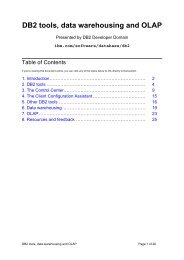You also want an ePaper? Increase the reach of your titles
YUMPU automatically turns print PDFs into web optimized ePapers that Google loves.
134 Everything You Ever Wanted to Know About DVD<br />
PC can generate the entire list of 409 keys, rendering the key secrecy process<br />
useless.<br />
In any case, there’s not much appeal to being able to copy a set of movie<br />
files (often without menus and other DVD special features) that would take<br />
over a week to download on a 56K modem and would fill up a 6G hard disk<br />
or a dozen CD-Rs. An alternative is to recompress the video with a different<br />
encoding format such as DivX (see “What Is Divx?” in <strong>Chapter</strong> 2) so that<br />
it will take less space, but this often results in significantly reduced picture<br />
quality. In spite of lower data rates of DivX et al, the time and effort it takes<br />
to find and download the files is not worth the bother for most movie viewers.<br />
The reality is that most people ripping and downloading DVDs are<br />
doing it for the challenge, not to avoid buying discs.<br />
The supporters of DeCSS point out that it was only developed to allow<br />
DVD movies to be played on the Linux operating system, which had been<br />
excluded from CSS licensing because of its open-source nature. This is<br />
specifically allowed by DMCA and WIPO laws. However, the DeCSS.exe<br />
program posted on the Internet is a Windows application that decrypts<br />
movie files. The lack of differentiation between the DeCSS process in Linux<br />
and the DeCSS.exe Windows application is hurting the cause of DeCSS<br />
backers, since DeCSS.exe can be used in the process of copying and illegally<br />
distributing movies from DVD. See OPENDVD.ORG and Tom Vogt’s<br />
DECSS CENTRAL for more information on DeCSS.<br />
Worthy of note is that DVD piracy was around long before DeCSS. Serious<br />
DVD pirates can copy the disc bit for bit, including the normally unreadable<br />
lead in (this can be done with a specially modified drive), or copy the<br />
video output from a standard DVD player, or get a copy of the video from<br />
another source such as laserdisc, VHS, or a camcorder smuggled into a<br />
theater. It’s certainly true that DVD piracy is a problem, but DeCSS has little<br />
to do with it.<br />
Shortly after the appearance of DeCSS, the DVD CCA filed a lawsuit and<br />
requested a temporary injunction in an attempt to prevent web sites from<br />
posting (or even linking to!) DeCSS information. The request was denied by<br />
a California court on December 29, 1999. On January 14, 2000, the seven<br />
top U.S. movie studios (Disney, MGM, Paramount, Sony [Columbia/TriStar],<br />
Time Warner, Twentieth Century Fox, and Universal), backed by the MPAA,<br />
filed lawsuits in Connecticut and New York in a further attempt to stop the<br />
distribution of DeCSS on web sites in those states. On January 21, the<br />
judge for the New York suit granted a preliminary injunction, and on January<br />
24, the judge for the CCA suit in California reversed his earlier decision<br />
and likewise granted a preliminary injunction. In both cases, the judges<br />
ruled that the injunction applied only to sites with DeCSS information, not<br />
to linking sites. The CCA suit is based on misappropriation of trade secrets<br />
(somewhat shaky ground), while the MPAA suits are based on copyright cir-



